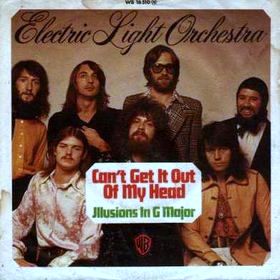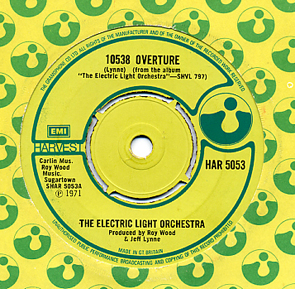
The Electric Light Orchestra (ELO) are an English rock band formed in Birmingham in 1970 by songwriters and multi-instrumentalists Jeff Lynne and Roy Wood with drummer Bev Bevan. Their music is characterised by a fusion of pop and classical arrangements with futuristic iconography. After Wood's departure in 1972, Lynne became the band's sole leader, arranging and producing every album while writing nearly all of their original material. From this point until their first break-up in 1986, Lynne, Bevan, and keyboardist Richard Tandy were the group's only consistent members.

Jeffrey Lynne is an English musician, singer-songwriter and record producer. He is the co-founder and currently the sole member of the rock band Electric Light Orchestra (ELO), which was formed in 1970, and as a songwriter has written most of the band's hits, including "Evil Woman", "Livin' Thing", "Telephone Line", "Mr. Blue Sky", "Don't Bring Me Down" and "Hold On Tight".

Face the Music is the fifth studio album by Electric Light Orchestra (ELO). It was released in September 1975 by United Artists Records and on 14 November 1975 in the United Kingdom by Jet Records. The album moves away from the large-scale classical orchestrated sound of the previous album, Eldorado, in favour of more "radio-friendly" pop/rock songs, though the string sections are still very prominent. The new sound proved successful for the group, for Face the Music was the first ELO album to go platinum.

On the Third Day is the third studio album by Electric Light Orchestra (ELO), and the first to be recorded without input from Roy Wood. It was released in the United States in November 1973 by United Artists Records, and in the United Kingdom on 14 December 1973 by Warner Bros. Records. From this album on, the word The was dropped from the band's name. The album was reissued on 12 September 2006.

ELO 2 is the second studio album by the Electric Light Orchestra (ELO), released in 1973. In the US, the album was released as Electric Light Orchestra II. It was the band's last album to be released by the Harvest label, the last on which the band used the definite article The in their name, and the one that introduced their abbreviated name 'ELO'.

A New World Record is the sixth studio album by Electric Light Orchestra (ELO). It was released on 15 October 1976 on United Artists Records in the U.S., and on 19 November 1976 on Jet Records in the United Kingdom. A New World Record marked ELO's shift towards shorter pop songs, a trend which would continue across their career.

Discovery is the eighth studio album by English rock band Electric Light Orchestra (ELO). It was released on 1 June 1979 in the United Kingdom by Jet Records, where it topped record charts, and on 8 June in the United States on Jet through Columbia Records distribution. A music video album featuring all the songs being played by the band was then released on VHS in 1979, then re-released as part of the Out of the Blue: Live at Wembley DVD and VHS in 1998.

ELO's Greatest Hits is a compilation by the Electric Light Orchestra (ELO), released 23 November 1979. Despite being released after the album Discovery, this album omitted the band's most recent hits, "Don't Bring Me Down" and "Shine a Little Love".

All Over the World: The Very Best of Electric Light Orchestra is a compilation album by the Electric Light Orchestra, released in 2005.

"Mr. Blue Sky" is a song by the Electric Light Orchestra (ELO), featured on the band's seventh studio album Out of the Blue (1977). Written and produced by frontman Jeff Lynne, the song forms the fourth and final track of the "Concerto for a Rainy Day" suite on side three of the original double album. "Mr. Blue Sky" was the second single to be taken from Out of the Blue, peaking at number 6 in the UK Singles Chart and number 35 in the US Billboard Charts.

"Can't Get It Out of My Head" is a song written by Jeff Lynne and originally recorded by Electric Light Orchestra.

"10538 Overture" is the debut single by Electric Light Orchestra (ELO), released in 1972.

"Do Ya" is a song written by Jeff Lynne, that was originally recorded by The Move, which became a hit for the Electric Light Orchestra in 1977.

"Ma-Ma-Ma Belle" is a song recorded by the Electric Light Orchestra (ELO).

"Evil Woman" is a song recorded by Electric Light Orchestra (ELO) and written by lead vocalist Jeff Lynne. It was first released on the band's fifth album, 1975's Face the Music.

"Telephone Line" is a song by English rock band Electric Light Orchestra (ELO). It was released in May 1977 through Jet Records and United Artists Records as part of the album A New World Record. It was commercially successful, topping the charts of Canada and New Zealand and entering the top 10 in Australia, the United Kingdom, and the United States.

"Don't Bring Me Down" is the ninth and final track on the English rock band the Electric Light Orchestra's 1979 album Discovery. It is their highest-charting hit in the United States to date.

"Last Train to London" is a song from the English rock band Electric Light Orchestra (ELO), the fifth track from their album Discovery.
"Mr. Radio" is a song recorded by the Electric Light Orchestra.

Light Years, The Very Best of Electric Light Orchestra is a two CD compilation album by Electric Light Orchestra (ELO), released in 1997.

















